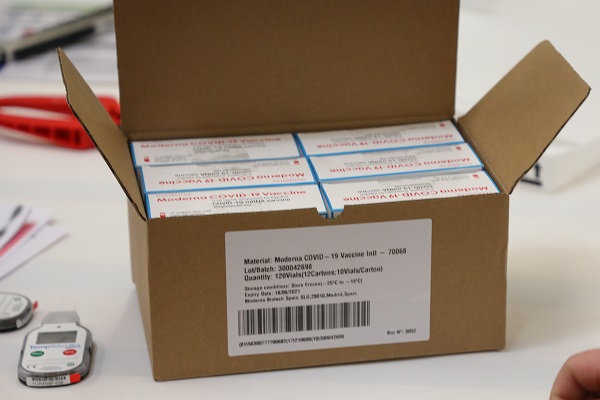 Credit: SIP / Luc Deflorenne
Credit: SIP / Luc Deflorenne
On Monday 11 January 2021, Luxembourg received a delivery of 1,200 doses of the Moderna COVID-19 vaccine.
Luxembourg is the first member state of the European Union (EU) to have received the anti-coronavirus vaccine from the US laboratory Moderna. After the marketing authorisation by the European Medicines Agency (EMA) and the green light given by the European Commission on 6 January, 1,200 doses of the Moderna vaccine were delivered to Luxembourg this morning.
The delivery means that Luxembourg now has two safe and effective vaccines against SARS-CoV-2.
An additional delivery of 4,875 doses of the BioNTech / Pfizer vaccine also arrived as planned today.
Moderna's formula has the advantage of being able to be stored at -20 °C, rather than -70 °C in the case of the Pfizer vaccine. The two vaccines have similar efficacy rates, according to their laboratories, of 95% and 94.1% respectively for Pfizer / BioNTech and Moderna, and are based on the administration of two doses.
In total, the Grand Duchy has so far reserved 110,462 doses of the Moderna vaccine and 414,210 of BioNTech / Pfizer vaccine.
How does the Moderna COVID-19 vaccine work? (source: EMA)
The Moderna vaccine is aimed at preventing COVID-19 in people aged 18 and over. It works by preparing the body to defend itself against COVID-19. It contains a molecule called mRNA which contains the instructions for making the spike protein; it is a protein on the surface of the SARS-CoV-2 virus that the virus needs to enter the cells of the body.
When a person receives the vaccine, some of their cells read the instructions from the mRNA and temporarily produce the spike protein. The person's immune system will then recognise this protein as foreign and produce antibodies and activate T cells (white blood cells) to attack it.
If the person later comes in contact with the SARS-CoV-2 virus, their immune system will recognise it and will be ready to defend the body against it.








